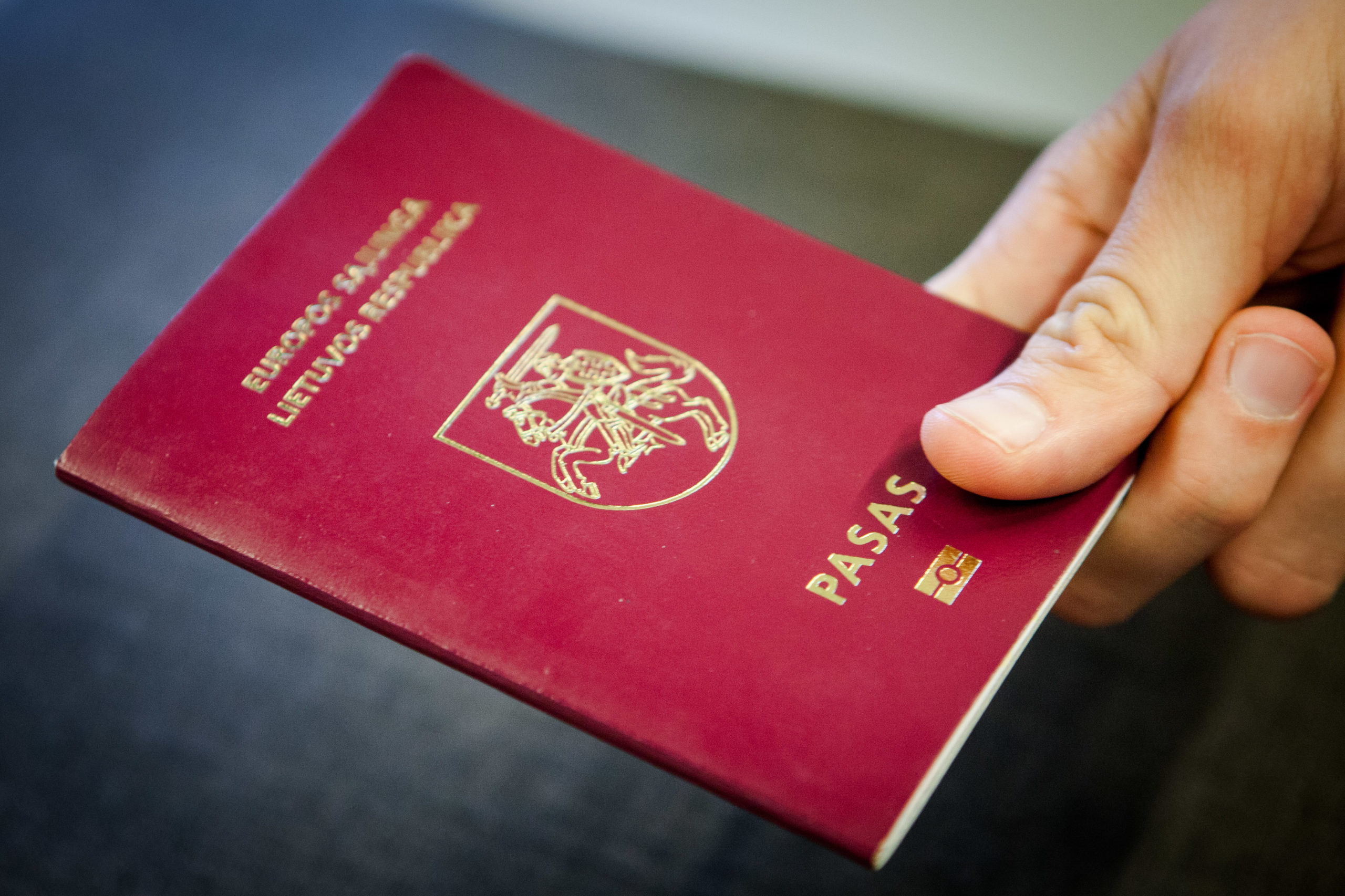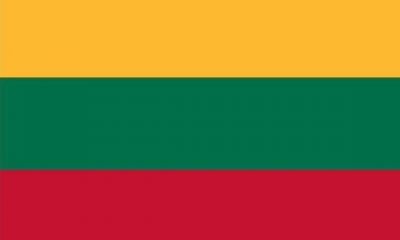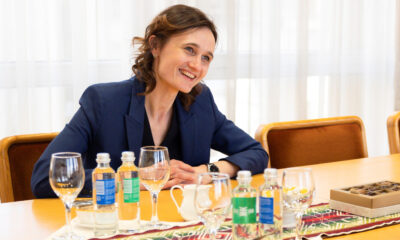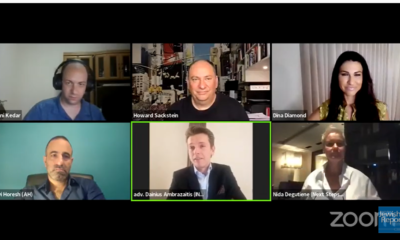
Banner

Legal amendment puts Lithuanian citizenship in reach
Thousands of Litvak Jews around the world stand a much better chance at getting Lithuanian citizenship based on ancestry since the law was amended last week.
A bill to amend Lithuania’s Law on Citizenship was unanimously passed in Lithuania’s Seimas (parliament) last Thursday, 20 January. It will have far-reaching positive implications for future applicants, many of whom had unsuccessfully tried and lost hope of obtaining citizenship.
This follows a year of extensive lobbying efforts from many quarters. It involved various iterations of a draft bill which was revised and redrafted several times, according to those involved, leading to last week’s vote, in which 110 members of parliament from across Lithuania’s political spectrum supported the bill.
Lithuanian Ambassador to South Africa Dainius Junevičius said the bill clarified that anyone who was a citizen of the Republic of Lithuania before 15 June 1940 was eligible for reinstatement of their citizenship on condition that there were no decisions adopted on their loss of citizenship.
This is a huge relief to many whose applications were rejected by the Lithuanian migration department, some pending indefinitely with others being placed on hold.
The application jam stemmed from a Lithuanian Supreme Court decision a few years ago which opened the law up for interpretation, making it much tougher, and which dramatically slowed down applications, causing enormous frustration.
In addition to what was always accepted as sufficient proof of Lithuanian citizenship, applicants were also required to provide proof that their Lithuanian immigrant ancestors actively sought to maintain their Lithuanian citizenship once in South Africa (or their new country of residence) until 15 June 1940.
This was a dramatic departure from the original position, which never required proof that citizenship was actively maintained after leaving Lithuania.
“This was a major obstacle for applicants as in almost all cases, no such proof exists. It also had far-reaching implications for all future citizenship applications,” said Lithuanian emigration consultant Nida Degutienė from Next Steps. Her company assists South Africans and others to obtain Lithuanian citizenship by helping to source the required documentation for reinstatement of their citizenship. She told the SA Jewish Report many of her clients’ applications had been declined by the migration department because of this.
In some cases where families had applied at different times using the same source documents, some had been granted citizenship, while others had been rejected.
However, this will soon change, said an elated Degutienė, who believes last week’s vote will pave the way forward for many South African Jews to successfully apply for citizenship.
“Less than a year ago, I was telling a story of a ridiculous court ruling which was applied to an unlucky Litvak family whose application for Lithuanian citizenship was rejected. Now I’m so happy to announce that the law has been amended, and this particular family, as many more, will be free to receive their passports.”
Degutienė and many others including politicians and lawyers in Lithuania and members of the South African Jewish Board of Deputies campaigned tirelessly for the amendment.
“I was really frustrated about the grey zone in the citizenship legislation which was used by Lithuanian institutions to create rules and obstacles that made many South African Litvaks ineligible for a Lithuanian passport,” said Degutienė. “The only way to solve this impossible situation was to change the law as any other solution would have been too temporary, and we would have had to depend on court procedures which are lengthy and costly.”
She said it had been a tough road.
“Not many colleagues or competitors believed I would succeed, but now as you see, if you put all your heart and effort into something, sooner or later it results in positive developments.”
Said Junevičius, “As we welcome this move by the Republic of Lithuania, removing many barriers to apply for the reinstatement of Lithuanian citizenship, we anticipate deepening connection with ancestral land and fully expect an exponential growth in economic relations and tourism.”
The director of AccessEU, Nicole Marcus, said this week, “AccessEU looks forward to overturning the negative decisions and restoring our 100% success record. Over the years, we’ve experienced changes to the requirements and process, at times becoming very difficult if not near impossible, and at other times easing somewhat. We urge everyone who is eligible to use this opportunity to apply for Lithuanian citizenship before any new interpretations might close the doors once again.”
Before the bill becomes law, Lithuania’s president will need to sign the bill into effect, and this is expected to happen soon.
Once enacted into law, the effect of this amendment will be to remove the requirement that one’s Lithuanian ancestor must have actively maintained their Lithuanian citizenship until 14 June 1940. That requirement was strictly enforced by the migration department since December 2020 following the Supreme Court decision in November 2020, when an application for citizenship with no supporting Lithuanian documentation was brought, causing serious ramifications for many other applicants.
Many applicants were refused citizenship on the basis that their Lithuanian ancestor had naturalised prior to 15 June 1940. Now the prospects of success for those applicants have been revived.
According to insiders, many hundreds of applications are believed to have been waiting for years for a decision following various procedural and then interpretative changes. Hundreds of applications which are currently held in suspense pending queries from Lithuania’s migration department which had been almost impossible to satisfy will now need to be reconsidered.
The migration department will probably take some time to work through the backlog, and applicants shouldn’t expect immediate results. They should keep in mind that the change in the law doesn’t mean that every applicant will be successful as each application will depend on its own supporting documentation which varies from one family to the next, insiders say.
Applicants are still required to prove that their Lithuanian ancestor left Lithuania after 16 February 1918 (the Republic of Lithuania’s initial date of independence) and must still prove with Lithuanian documentation that they held Lithuanian citizenship and departed from Lithuania.
One of the questions still being asked is whether those whose ancestors arrived in South Africa prior to 1918 will be able to apply for a passport.
“The answer is no,” said Degutienė. “This law does not extend the right of applying to those who emigrated earlier than the State of Lithuania was established, and it’s unlikely this will ever change.”
Degutienė said the amendment wouldn’t have been made possible without the help of Lithuanian Member of Parliament Dalia Asanavičiūtė. “Without her persistence and resilience against huge pressure from the migration department and opposition, and her deep understanding and respect for Jews, this change would never have been possible.”
Junevičius said the amendment was a very positive development, and would probably ensure the success of many pending and future applications.
He encouraged prospective passport holders to show an interest in Lithuania, saying that amongst other things, the country offered a broad range of international study programmes taught in English in its 19 universities and 22 colleges at a highly competitive price.
Nearly 8 000 students from 127 countries in the world including South Africa and Israel studied in Lithuania in the 2020 to 2021 academic year, Junevičius said. “The reasons to choose Lithuania as your study destination are multiple, but the main ones are high quality world-class education for an affordable price in an attractive European country.”
As for business opportunities, Junevičius said that for the past 20 years, Lithuania had been the fastest growing economy in the European Union in terms of gross domestic product per capita, with a “highly favourable business environment” with top rankings and ratings.
“Things here get done quicker and better because the doers – from students and engineers to the go-to advisors at Invest Lithuania – are agile, ambitious, and driven by big ideas. And when it comes to big ideas, we don’t dabble, we explore, from gene and cell therapy to the latest in machine learning.”










